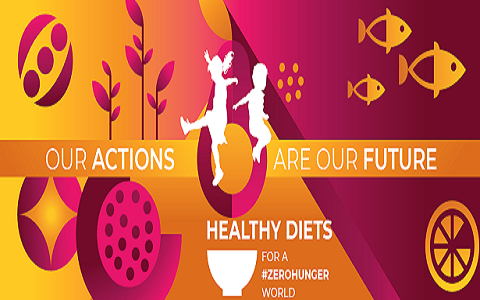

The number two goal of the Global Sustainable Development, SDGs, to improve people’s lives by 2030 is zero hunger.
The goal is targeted at ending hunger, achieving food security, improving nutrition and promote sustainable agriculture.
Little wonder then, why the 2019 World Food Day has, as its theme “Healthy Diets for a Zero-Hunger World”.
The Food and Agriculture Organization, FAO, of the United Nations noted that, urbanisation and available income had affected the diets and eating habits of people across the globe.
It is observed that many people had shifted from eating plant-based and fibre-rich meals to processed foods, and they prefer delicacies from fast food outlets to foods prepared at home.
The country representative of FAO in Nigeria, Suffyan Koroma, while reaffirming the organisation’s commitment to zero hunger, described the day as an opportunity “to reflect on what to eat, how we eat it and where we get it from”.
While commenting on the theme of the 2019 World Food Day, a dietician, Mrs. Oluwatooni Opelami said, good eating habits help prevent frequent visits to hospitals.
She said healthy foods help to keep fit and boost the immune system especially of the young children.
Mrs. Opelami submitted that, nutritious foods are available and affordable, contrary to the belief of some people that, only the wealthy can access them.
Similarly, a nutritionist, Mrs. Oluwatoyin Bolarinwa explained that poor quality diets could make the brain weak and lead to many disorders such as obesity, type-2 diabetes, and cancer.
Mrs. Bolarinwa therefore advised the people to consume foods from natural sources such as legumes, cereals, fruits and vegetables.
Meanwhile, the federal government has reiterated its commitment to ensure food sufficiency and healthy living.
The permanent secretary, Federal Ministry of Agriculture, Mohammed Bello-Umar at a rally to mark the World Food Day, in Abuja, said the ministry would open up lands for agricultural activities.
He noted that there was no need to import rice, because the country had attained self-sufficiency in rice production.
Statistics reveals that, globally, more than 670 million adults are obese, in addition to 120 million children between the ages of 5-19 years in similar condition, while ironically, over 820 million people still suffer from hunger.
The 2019 World Food Day is calling for action across sectors to make healthy and sustainable diets, affordable and accessible to everyone.
Afolasade Osigwe